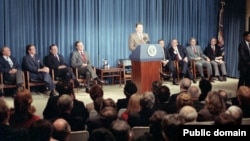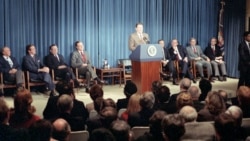On December 16, 1983, then-U.S. President Ronald Reagan inaugurated the National Endowment for Democracy, or the NED. This private, bipartisan, congressionally-funded foundation has supported democratic movements for 30 years.
President Reagan outlined the objectives for U.S. promotion of democracy in Westminster, England in 1982:
“To foster the infrastructure of democracy, the system of a free press, unions, political parties, universities, which allows a people to choose their own way to develop their own culture, to reconcile their own differences through peaceful means.”
The NED helps fund four U.S. organizations that represent these building blocks of a Democratic Society. The Center for International Private Enterprise; the International Republican Institute and the National Democratic Institute for International Affairs all celebrate their 30th anniversaries as well this year. The Solidarity Center, founded in 1997, supports workers’ rights.
Today, the NED also makes more than 1000 grants each year to non-governmental groups or N-G-Os who are working for democratic goals in more than 90 countries.
The NED’s private, bipartisan board enables it to provide grants independent of U.S. government interests. The organization also publishes the Journal of Democracy, runs a fellowship program, organizes a global network of democracy activists and runs a center to support international media.
While the NED has expanded its programs and outreach since Reagan’s era, its president, Carl Gershman, explains that its fundamental work has not changed:
“The mission, remains the same, to support Democracy, what’s broadened, is the movements. … This work has literally spread all over the world. It was not that way in the 1980s.”
“The marvelous thing is that so many countries are now on this track of learning,” said Mr. Gershman, noting that Democracy does not come quickly:
“Democracy is a process and you can only achieve democracy by practicing democracy. It’s a hard thing to understand, but it’s fundamental to what we do.”
“The task I set forth, will long outlive our own generation,” said President Reagan, “For the sake of peace and justice, let us move toward a world in which all people are at last free to determine their own destiny.”
President Reagan outlined the objectives for U.S. promotion of democracy in Westminster, England in 1982:
“To foster the infrastructure of democracy, the system of a free press, unions, political parties, universities, which allows a people to choose their own way to develop their own culture, to reconcile their own differences through peaceful means.”
The NED helps fund four U.S. organizations that represent these building blocks of a Democratic Society. The Center for International Private Enterprise; the International Republican Institute and the National Democratic Institute for International Affairs all celebrate their 30th anniversaries as well this year. The Solidarity Center, founded in 1997, supports workers’ rights.
Today, the NED also makes more than 1000 grants each year to non-governmental groups or N-G-Os who are working for democratic goals in more than 90 countries.
The NED’s private, bipartisan board enables it to provide grants independent of U.S. government interests. The organization also publishes the Journal of Democracy, runs a fellowship program, organizes a global network of democracy activists and runs a center to support international media.
While the NED has expanded its programs and outreach since Reagan’s era, its president, Carl Gershman, explains that its fundamental work has not changed:
“The mission, remains the same, to support Democracy, what’s broadened, is the movements. … This work has literally spread all over the world. It was not that way in the 1980s.”
“The marvelous thing is that so many countries are now on this track of learning,” said Mr. Gershman, noting that Democracy does not come quickly:
“Democracy is a process and you can only achieve democracy by practicing democracy. It’s a hard thing to understand, but it’s fundamental to what we do.”
“The task I set forth, will long outlive our own generation,” said President Reagan, “For the sake of peace and justice, let us move toward a world in which all people are at last free to determine their own destiny.”

















